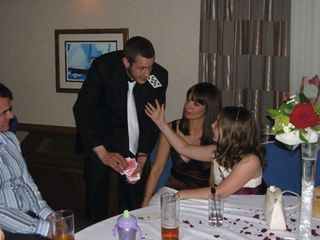Pirates should perhaps be wary of downloading stolen material for another reason. Some creators of new magic tricks deliberately seed file-sharing networks with corrupted versions of their material. The person downloading and learning it might think he's about to stun his friends, but the creator is actually playing an elaborate trick on him that will make him look stupid.
This is an approach that's catching on, but others simply mark each copy of their work so that they can tell who the upload has come from. "Part of the approach I take to piracy of the material I sell commercially is to mark each copy so that I can at least backtrack," says Brook.
"One of my books is over 600 pages long, and you'd think it was safe from piracy, but it wasn't. Doing a search on various filesharing sites, I came across it. I thought it was one of the ones that I'd put there to fool people, but no, someone had scanned all those pages. You have to wonder at someone who spends all that money on a 600-page book and then thinks: 'I'm going to scan that bad boy in'".
The dealer's view
Costas Damianou runs the Magic Tau online store. Willful sharing of secrets that may have cost the person sharing them a considerable amount of money to buy makes him genuinely angry.
"A while back I heard that a friend's books were being pirated, so I decided to conduct an experiment," he says. Within just 20 minutes he had found online copies of DVDs, books and lecture notes with a commercial value of thousands of pounds. "A few of these had only been released a few hours before," says Damianou.
"This means that someone went to the expense of buying them and then giving them all away for free." But such people seem to think they are some kind of hero or modern day Robin Hood.
Get daily insight, inspiration and deals in your inbox
Sign up for breaking news, reviews, opinion, top tech deals, and more.
What's Damianou's message to them? "Let me tell you something for nothing," he says. "You are not taking from the rich and giving to the poor, you are a thief giving to other thieves and freeloaders. Anyone who uses these sites is not only breaking the law; they also have no right to call themselves a magician. We have ethics in magic and we do not steal from our peers."

TALK MAGIC: Some members of the TalkMagic forum have gone on to find commercial success
Some pirates see so little wrong with what they're doing that they'll even brag to the people it hurts: "I have heard customers say that they will never buy a magic DVD as they can get it for free either by downloading it or getting a copy from a friend," says Damianou.
"This being said directly to the retailer shows how much people don't see that what they're doing is harming the industry."
Sharing success
Piracy apart, a mark of just how popular magic has become is that online magic forums are thriving. They're community sites where magicians, the creators of the tricks they perform and even magic dealers can be found debating the latest techniques and swapping ideas.
Paul Stevens is the chief moderator at Talk Magic, one of the UK's largest online magic forums. "The development of Talk Magic, along with other discussion boards, has certainly affected the art of magic," he says.
"Many newcomers display great enthusiasm but are quickly disappointed to find that the real secret to magic is practice, presentation, hard work and commitment. Anything less results in very poor magic and annoyed spectators."
This is something that resonates with Rich Newman. "Magic is very expensive," he says. "It's one of the most expensive and disappointing hobbies there is. You see something and go 'WOW!' but then you get the trick and go 'Oh', because there's a lot of work to fit it into your routine and your personality."

COSTLY BUSINESS: As a semi-professional, Rich Newman struggles with magic's expense
For those willing to put the hours in, however, fame and fortune could beckon, as Stephens confirms: "Many of our members have gone on to commercial success either in terms of performing or releasing their own work to great acclaim."
"I really like the fact that some of the forums have well-known magicians that will interact with other members," adds Ward. "And the dealers too – it is possible to ask any questions about their products and voice any concerns. It's also nice to talk to other professionals, exchange ideas and give a few tips to non-pros and people who are new to magic."
A vital aspect to magic forums is the review section. Reviews are posted by members, and can make or break a new trick. "Using a method or trick in the real world is a lot different to using it in your bedroom, so I always like it when you hear of workers giving their views of how it all pans out in the field," says Ward.
"One aspect [of Talk Magic] I'm particularly pleased to see," says Stephens, "is the rise and development of regional meetings. Not content with just sitting in front of a keyboard and chatting online, several groups of members have arranged to meet – usually in a pub somewhere – and share their art with each other as well as the public."
This is a great idea, but if you're meeting in a pub for an afternoon of vanishing coins, finding cards, reading thoughts or hypnosis, it's a good idea for someone to ask the landlord or manager if it's OK before you begin. Having attended several such meetings, I've witnessed first hand staff ejecting magicians after becoming worried that their activities might constitute a performance, which under some bylaws can require a licence.
Despite all the potential pitfalls, though, there's no doubt that the internet has altered the practice of magic for good, and no amount of trickery will change that.











